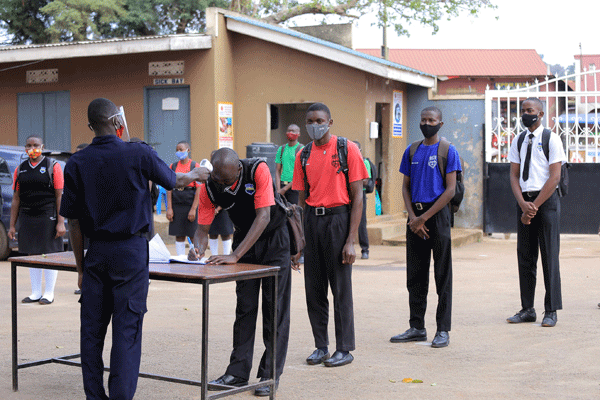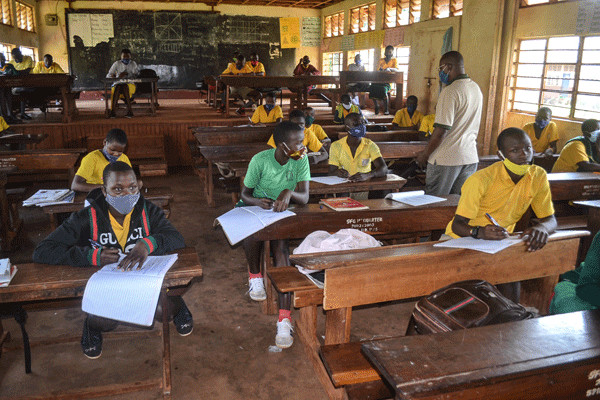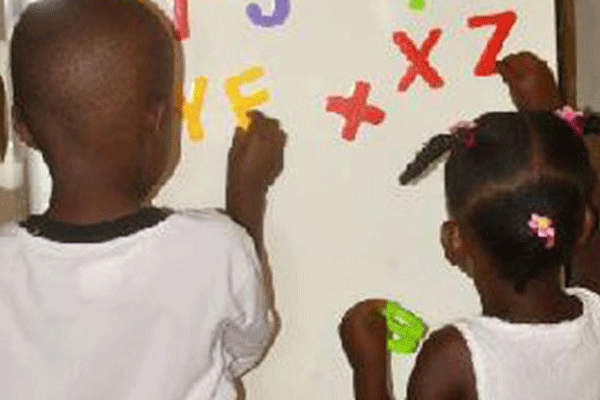Prime
Schools impose extra fees to implement SOPs

Students wear masks while reporting to school last year. PHOTO/FILE
What you need to know:
- Schools say the charges are unavoidable in the fight against Covid-19.
Several schools have introduced additional charges to facilitate the implementation of standard operating procedures (SOPs) in a bid to step up the fight against Covid-19.
Next month, all schools will reopen after nearly two years of closure following the outbreak of Covid-19.
But parents are already bracing for harder times since most schools have hiked fees, citing high costs of living and Covid-19 induced debts.
While schools concur with government that they must prioritise safety of learners to avoid the spread of Covid-19, they insist that extra charges are unavoidable.
In Soroti District, Mr John Patrick Tukei, the chairperson of Board of Governors of Asuret Seed Secondary School, said: “The old budgets and scholastic requirements will remain but we may have to ask for some contribution to facilitate the establishment of handwashing facilities and procurement of sanitisers, soap and face masks, among others.”
In Kings College Buddo, besides the extra charges, each student will be required to carry face masks, sanitisers and other SOP requirements.
“For compliance with the Covid-19 protocols and SOPs, students who are of the recommended age for vaccination should do so before reporting to school while carrying their vaccination cards along, each student should carry at least five pieces of reusable masks and pocket-size sanitisers,” he said.
The Director of Crown High School Maranatha in Kamwenge District, Mr Silver Twesigye, said they are planning to charge between Shs10,000 to Shs15,000 as contribution to purchase soap and sanitisers.
“We have two proposals to either charge money from students for the school to buy sanitisers and soap or we request students to come with soap and sanitisers,” he said.
Mr Johnson Mayanja, the director of Western High School in Masindi District, said students will be required to pay Shs20,000 extra fees.
Mr Paul Etiang, the headteacher of St Martha Junior School, a private primary school in Soroti City, said learners are required to pay Shs5,000 each as a supplementary budget for implementing Covid-19 measures.
In Kabale District, the director of Kabale Trinity College, Mr Joab Tumwebarize, said each student will have to pay Shs20, 000 on top of the school fees to buy sanitisers.
He said the school has put in place all the necessary measures to ensure observance of the SOPs.
Mr Tumwebarize appealed to the parents to support the school.
Mr Levi Abongo, the deputy head teacher at St Katherine Secondary School, said: “We have set up an isolation unit at the school where suspected cases of Covid-19 cases will be confined before they are tested. And if the results turn out positive, then they will be referred for treatment at Lira Regional Referral Hospital treatment centre.”
Mr Abongo said parents will be required to buy at least three pairs of face masks and two one-litre bottles of hand sanitisers. The school will also provide handwashing facilities at the entrances of the gate, classrooms, dormitories, and offices.
The director of Rwimi Parents Primary School in Bunyangabu District, Mr Willy Mugisha, said pupils are required to carry one litre of sanitiser.
“As a school, we shall use part of school fees to buy what will be required for other SOPs,” he said.
In Gulu, Hider Nursery and Primary School, parents are required to pay an additional Shs44,000 to cater for SOPs.
While at Vanguard PS, the school fees was increased from Shs250, 000 to Shs273, 800 to cater for SOPs.
Credo Kindergarten and Primary School have also hiked their school fees to Shs1, 217,000 to accommodate SOPs requirements.
Mr Ishaka Mbalirwa, the headteacher of Madina Islamic SS, Nsangi, asked government to intervene, adding that both schools and parents are struggling financially.
Mr Buruhane Mugerwa, the headteacher of Kawempe Muslim Secondary School, said they are ready to welcome students when they report back.
“The responsibility of vaccinating people lies with the Ministry of Health. So, we shall receive the students as we wait for the guidance on how we can deal with those who are not vaccinated or not tested for Covid-19,” he added.
Background
Eighteen months since the outbreak of Covid-19 in Uganda, the country’s schools remain largely closed, trapping at home some 15 million learners and leaving parents in a dilemma.
The government peddled virtual teaching and learning as options, but the free radios it promised and later substituted the word with television sets, have not materialised, rendering online education only feasible for the wealthy whose children study at elite urban institutions.
Compiled by Tobbias Jolly Owiny, Olivier Mukaaya, Phoebe Masongole, Joseph Omollo, Bill Oketch, Patrick Ebong, Simon Peter Emwamu, Rashul Adidi, Simon Wokorach, Al Mahdi Ssenkabirwa Ambrose Musasizi, Malik F Jjingo, Robert Muhereza, Emmanuel Arineitwe, Alex Ashaba, & Ismail Bategeka.




